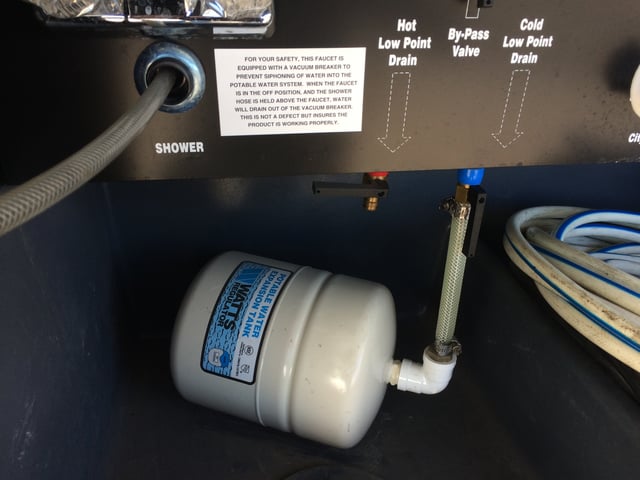Rv plumbing problems can cause significant inconveniences and disruptions to your travel plans. We will discuss common issues that can arise with your Rv plumbing system and provide actionable solutions to help you resolve them quickly and effectively.
From leaky pipes to clogged drains, we will cover it all, equipping you with the knowledge and skills to tackle these problems head-on. Whether you are a seasoned Rv owner or new to the world of recreational vehicles, this guide will serve as your go-to resource for troubleshooting and fixing plumbing issues in your Rv.
So, let’s dive in and get your Rv plumbing back in working order!

Credit: m.youtube.com
Leaking Pipes And Fittings (subheading)
Leaking pipes and fittings are common plumbing problems that can cause significant damage if not promptly addressed. There are several causes of leaks, including:
- Corrosion of pipes
- High water pressure
- Poor pipe joint connections
- Freezing temperatures
To identify and locate leaks, you can look for signs such as dampness or water stains on walls, ceilings, or floors. You can also monitor your water meter for fluctuations when no water is being used. Once you’ve identified the location, you can fix minor leaks yourself with DIY solutions. For example, applying pipe sealant tape or tightening loose fittings can often stop leaks.
However, for more complex leaks, it’s best to consult a professional plumber to ensure the problem is properly addressed. Regular maintenance and inspection of your plumbing system can help prevent leaks and minimize potential damage.
Clogged Drains And Toilets (subheading)
Rv Plumbing problems can be frustrating, especially when dealing with clogged drains and toilets. Common causes of clogs in RV plumbing include hair, soap residue, food particles, and toilet paper buildup. To prevent clogs, ensure only biodegradable toilet paper is used and avoid putting grease, oil, or large quantities of food down the drain. Regularly clean the drain and toilet using an RV-friendly plumbing cleaner to prevent buildup. In case of clogs, try using a plunger or a drain snake to dislodge the blockage. For stubborn clogs, a mixture of baking soda and vinegar can be poured down the drain to break up the obstruction. Additionally, maintaining proper water pressure and using a filter can also help prevent clogs in the RV plumbing system. By following these tips and adopting a proactive approach to maintenance, you can keep your RV plumbing free from clogs and ensure smooth and worry-free travels.
Water Heater Malfunctions (subheading)
Signs of water heater issues:
- Insufficient hot water
- Complete lack of hot water
- Discolored or foul-smelling water
- Strange noises coming from the water heater
- Water leakage from the unit
Troubleshooting common water heater problems:
If your water heater is showing any of the signs mentioned above, there are a few troubleshooting steps you can take. Firstly, check the power supply to the water heater and ensure it is functioning properly. Next, examine the thermostat to ensure it is set at the correct temperature. If the water is discolored or smells, flushing the tank might help. Lastly, if none of these solutions work, it is best to consult a professional plumber for further inspection.
Repair options for malfunctioning water heaters:
The repair options for malfunctioning water heaters can vary depending on the extent of the problem. In some cases, a simple repair or replacement of a faulty component, such as the thermostat or heating element, may solve the issue. However, if the water heater is old or severely damaged, it may be necessary to replace the entire unit. It is important to consult a professional plumber to accurately diagnose the problem and provide the most suitable repair solution.
Frequently Asked Questions Of Rv Plumbing Problems
How Do I Find A Leak In My Rv Water System?
To find a leak in your RV water system, start by turning off the water supply. Then, carefully inspect all visible pipes, connections, and faucets for any signs of water dripping or pooling. Use soapy water to check for leaks by spraying it on the suspected area and watching for bubbles.
What Kind Of Plumbing Do Rvs Use?
RVs typically use a combination of plastic and metal plumbing systems to deliver water and remove waste. The plumbing system includes pipes, valves, faucets, and pumps to ensure a reliable water supply and functioning toilet and shower.
Is Rv Plumbing The Same As House Plumbing?
RV plumbing is not the same as house plumbing. RV plumbing systems are more compact and designed to fit the limited space available in recreational vehicles. They also require specialized equipment and materials to handle the unique challenges of on-the-go plumbing.
Can You Use Pex In Rv?
Yes, you can use PEX in an RV. PEX is a flexible plastic tubing that is durable and resistant to freezing, making it a popular choice for RV water systems. It is easy to install, lightweight, and can withstand high temperatures and pressures.
Conclusion
Dealing with RV plumbing problems can be a challenging task for any camper. However, by being proactive and taking necessary precautions, such as regular maintenance and proper usage, you can avoid many common issues. Remember to address minor leaks and clogs promptly to prevent further damage.
By keeping an eye on your RV’s plumbing system, you can ensure a smooth and hassle-free camping experience.
